Climate Change, Heritage, Culture and Diversity Take Centre Stage at 2023 Asian Undergraduate Symposium
August 10, 2023
IN BRIEF | 15 min read
- Against a backdrop of geopolitical tensions and the climate crisis, this year’s Asian Undergraduate Symposium – an annual conference organised by NUS College with the support of the Temasek Foundation – strove for a unifying theme: Interconnected Communities.
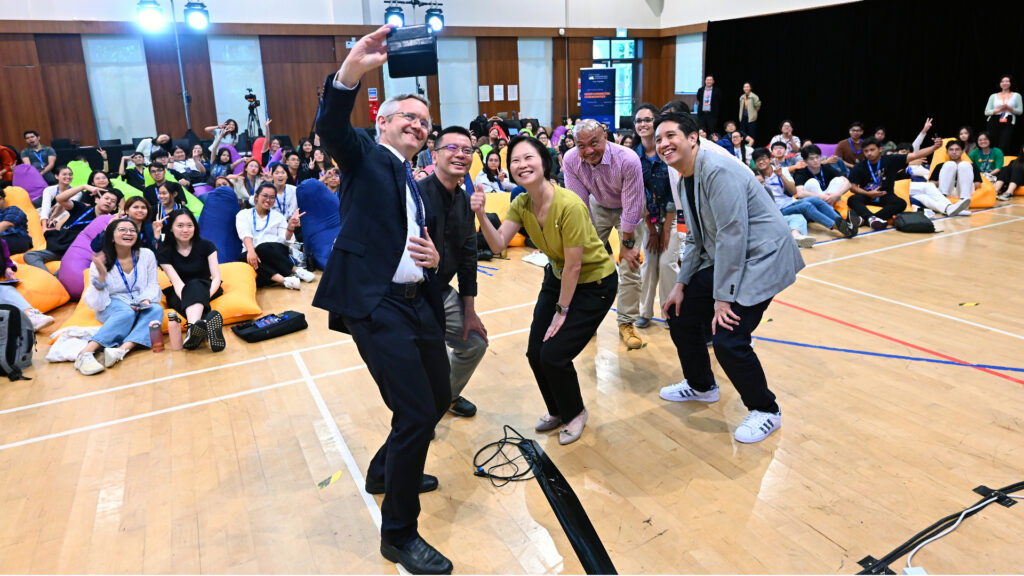
Against a backdrop of geopolitical tensions and the climate crisis, this year’s Asian Undergraduate Symposium strove for a unifying theme: Interconnected Communities.
Organised by NUS College, the honours college of the National University of Singapore (NUS), with the support of the Temasek Foundation, the annual international conference invites speakers to share insights into pressing global issues, and participants to craft proposals tackling a problem statement of their choice.
This year’s edition, which ran from 9 to 22 July at NUS University Town, brought together about 150 students from universities and other tertiary education institutions across ASEAN – Brunei, Cambodia, Indonesia, Laos, Malaysia, Myanmar, Philippines, Thailand, Vietnam and Singapore.
Students took part in a myriad of activities that empowered critical thinking, cultivated appreciation for diverse cultures and allowed them to connect and share experiences and knowledge. These included panel discussions, learning journeys and site visits to non-profit organisations that are helping to tackle social and environmental issues, and a fireside chat with Minister of State for Education and Manpower Ms Gan Siow Huang.
During the fireside chat, MOS Gan encouraged the young leaders in the audience to be unafraid to start projects that could benefit their communities at-large and help shape positive mindsets, reiterating that the students of today would be changemakers of our future.
Among the highlights of the two-week symposium was a series of panel-led sessions featuring invited speakers who offered much food for thought into the Symposium’s four main sub-themes: Climate change and sustainability, diversity and inclusion, heritage and culture, and needs and wants.
Inspiring Change through Social Media
With the planet hurtling towards the point of no return if the target of limiting global warming within acceptable thresholds is left unchecked, the first sub-theme – Climate Change & Sustainability – garnered much interest.
Nature influencer Ms Kong Man Jing’s engaging talk on “Science Communication and Education through Social Media” outlined four key benefits of using social media to teach science: fostering scientific literacy, breaking down barriers, correcting misinformation, as well as collaboration and dialogue.
Also known as Biogirl MJ, the former science teacher and Environmental Science graduate from NUS is famous for her “edutainment” channel Just Keep Thinking, which can be found on major social media platforms such as YouTube, TikTok, Instagram and Facebook. Through bite-sized, entertaining videos, she breaks down complex scientific concepts into simple lessons.
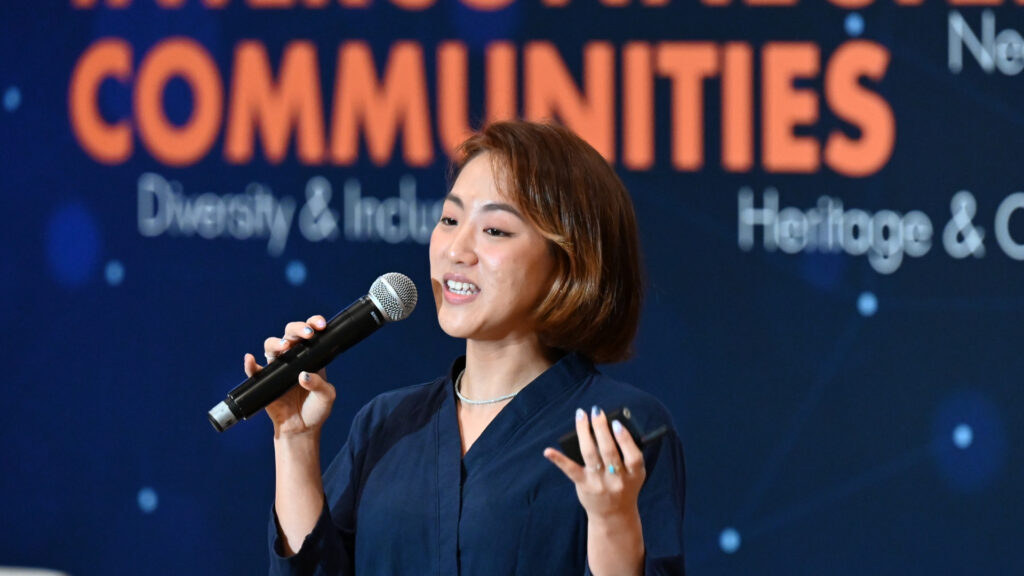
Another talk was “Finding your Unique Pathway into Sustainability” by Ms Chan Kah Mun. Ms Chan, who recently joined Schneider Electric’s Sustainable Leadership Programme, challenged her audience to venture into the unfamiliar by spotting gaps and “growing into” them – bringing life to otherwise untouched areas, just like a plant would.
She presented three principles everyone can adopt to find their own pathways into sustainability: let love be your light in your dark, let curiosity be your compass, and become limitless when you know your limits.
Being Inclusive – and Informed
The next symposium sub-theme, Diversity & Inclusion, addressed increasingly important social and workplace issues in today’s globalised – and often polarised – world.
One of these is mental health. Dr Jean Liu, Adjunct Assistant Professor at the NUS Yong Loo Lin School of Medicine, pointed out that a key challenge in tackling mental health issues is often a lack of information.
In August 2020, Dr Liu and her team entered locked-down dormitories to conduct mental health surveys on the resident migrant workers. What they discovered was surprising – the data revealed an overall high level of resilience among the workers despite their difficult situation and financial worries, as many were the sole breadwinners of their families.
This valuable information guided their strategy in formulating solutions for the workers and also sparked a wider discussion among Singaporeans on whether movement control measures for migrant workers were necessary.
In line with the theme of diversity and inclusion, Mr Ken Chua, Founder and Director of inclusive design agency (these)abilities, spoke about “Disabling Disabilities through Inclusive Design”.
Often, inclusive designers fail to consult people with disabilities, resulting in their products failing to achieve their intended purposes, he said. To him, inclusive design is not just designing for people with disabilities but with them, giving them the skills to design on their own too.
Heritage in the New Age
A series of talks on Heritage & Culture also raised provoking questions.
In “Distributed Remembering, Meaning-Making: The Role of Digital Technologies in Understanding Heritage in Singapore”, Associate Professor Natalie Pang, Deputy Head at NUS’ Communications and New Media Department, noted that social media makes heritage and its meanings more accessible to the layman. But transmitting heritage via social media can also cause it to lose its meaning as it is passed between platforms and users, she added.
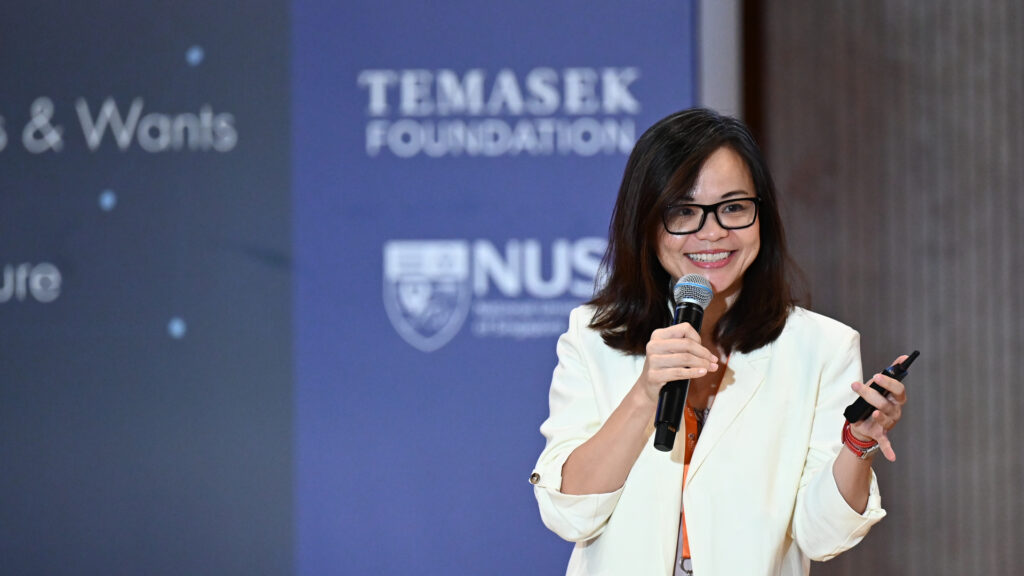
Then there was “Heritage & Culture: Conservation in the Age of Cosmopolitanism”, where human geographer Izni Azrein bin Noor Azalie presented the case study of Kampong Ayer, a water settlement in his home country of Brunei.
In today’s globalised world, it has been a struggle to keep the place afloat because of the area’s low-scale economic activity, he noted. A solution could be to transform Kampong Ayer into a cultural and heritage product that is experiential, immersive, knowledge-based and sustainable, attracting tourists to it.
Championing Basic Human Rights
The final sub-theme, Needs & Wants, offered further food for thought. Ms Griselda (Gay) Santos zoomed in on two of the United Nations’ 17 sustainable development goals (SDG) – gender equality, as well as clean water and sanitation.
In a thought-provoking address titled “Women (SDG5), Water (SDG6) and Inclusion”, she described the struggles of many women in Southeast Asia, who lack access to affordable finance and financial products, as well as technology, financial and digital literacy. But before these inequalities can be properly addressed, Ms Santos shared that something as basic as the water challenge first needs to be fixed.
Ms Santos was referring to access to clean water, a problem which still plagues many communities around the world. This is what prompted her to join Water.org, an international non-profit co-founded by American actor Matt Damon, that is empowering millions of people around the world with sustainable access to safe water or sanitation by partnering with public utilities and financial institutions.
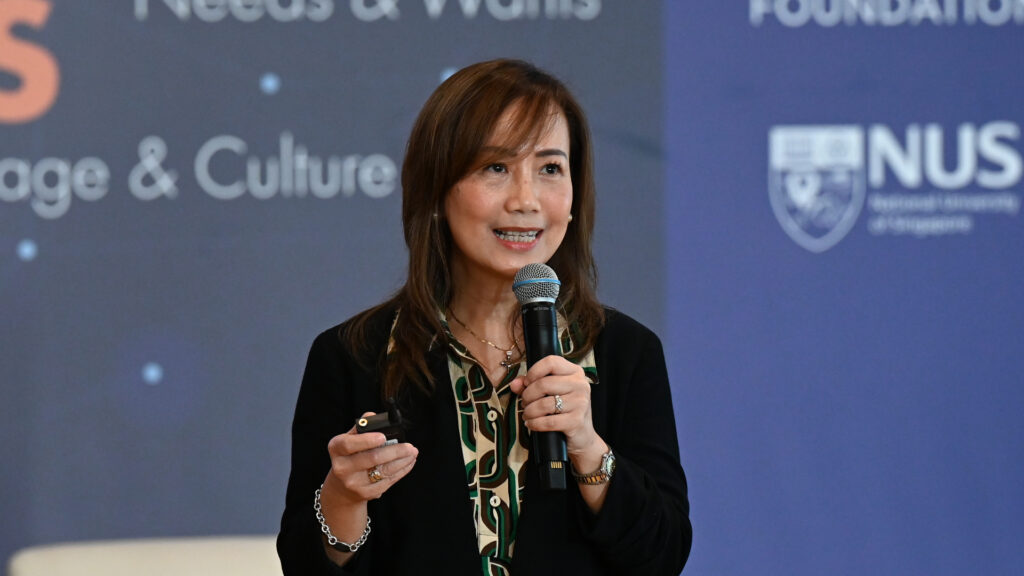
Driving home the urgency of the work at hand and the importance of collective action, she left the audience with a question that has an easy answer but no simple solution: “Which would you prefer – a day without internet or a day without water?”
The topic of access to essential resources loomed large again in “Achieving Food and Nutrition Security through Sustainable Food Systems”, a talk by Ms Merry Lianita. The Nutrition and Food Systems graduate student at Belgium’s Ghent University told the audience that 3.1 billion people worldwide cannot afford a healthy diet, with 162.1 million people in Southeast Asia facing this plight.
This can be addressed by tackling four different areas – food production, supply chain, consumer behaviours and diets, she said. But the solutions must be sustainable so that food security for younger generations is not compromised, and every human’s basic right to food is met, she added.
These panel discussions from local and regional experts have enabled students to examine the interconnections between issues and challenges that we face, while visits to communities like the GroundUp Initiative, the Harmony Centre and Green Nudge gave participants a first-hand view of how systems address issues in different ways, and how policy implementation can be tricky and complex.
The insights and understanding of issues gained set the pace and tone for the rest of the symposium where students brainstormed and discussed possible solutions to issues like climate change and sustainability, heritage and culture, and diversity and inclusion.
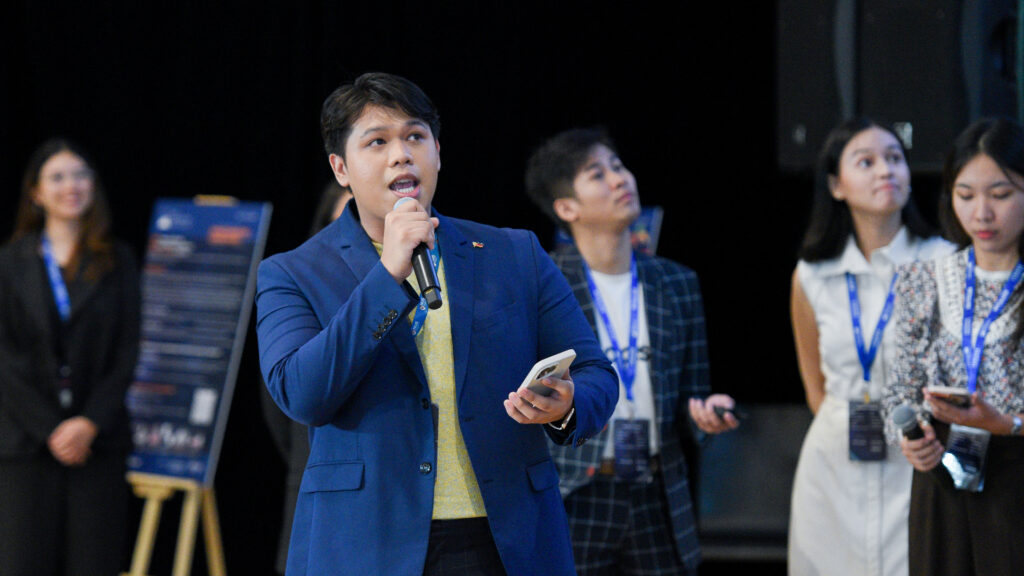
Winners with the most compelling proposals will be awarded $5,000 with three months to actualise their ideas, working with communities and local organisations to make a positive impact on some of today’s social and environmental issues.
This story first appeared in NUSnews on 10 August 2023.

